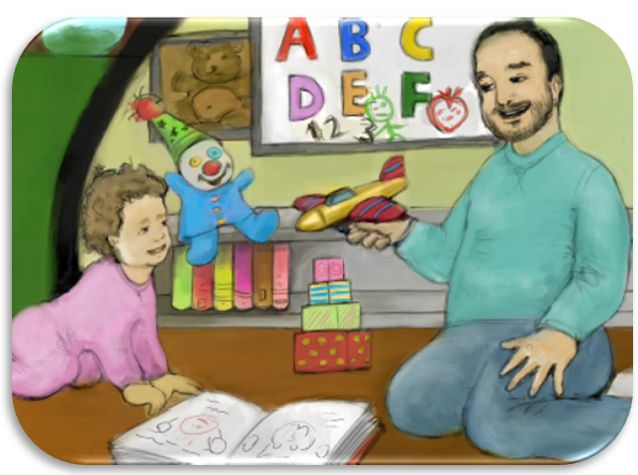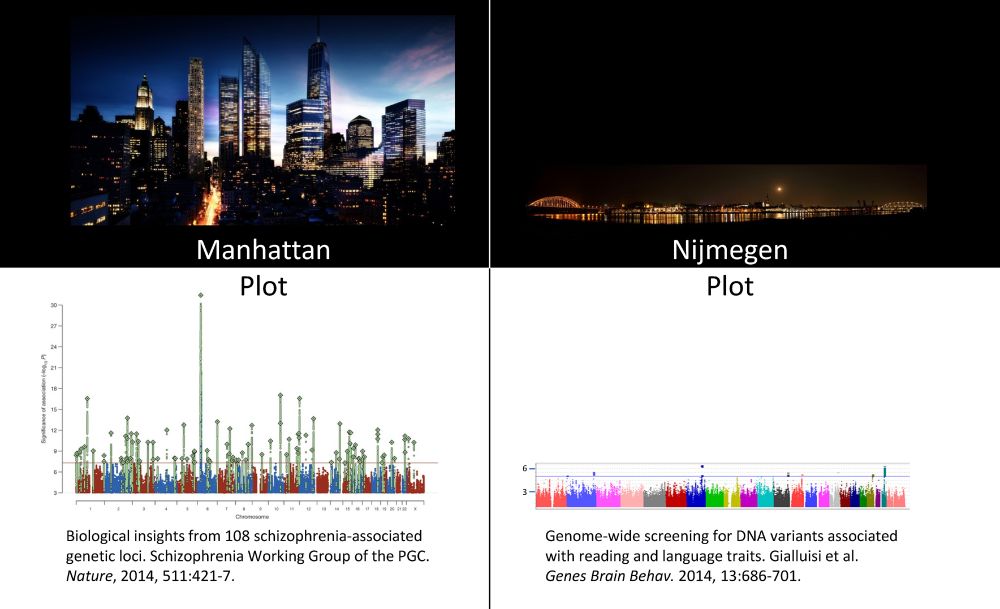Happy international day of women im science day. 🥳 From the MPI for Psycholinguistics ... led by a majority women directorate. It can be done :)
11.02.2026 09:57 — 👍 17 🔁 5 💬 0 📌 0
I will just show you once you're back :D
17.12.2025 19:25 — 👍 0 🔁 0 💬 0 📌 0
Today, I'm in Amsterdam, attending a gathering (I live more in the south of NL). As I walk in the streets all I want to say is that Amsterdam has so much the feeling of OLD money and OLD poverty :)
16.12.2025 08:56 — 👍 3 🔁 0 💬 1 📌 0
Pleitropy (a set of known variants influencing the target 'positive' trait yet also potentially influencing another unknown -perhaps negative- outcome is already concern by itself (even if you don't care about the ethics and exacerbeting existing inequalities part of it which obviously you should)
17.11.2025 09:08 — 👍 3 🔁 1 💬 0 📌 0

Photograph of researchers at their benches in the custom-built molecular biology labs of the Max Planck Institute in Nijmegen, with green trees of the forest outside visible through large windows in the background.
Come join us for a 4-year PhD on effects of rare gene disruptions involved in speech disorder, investigated in human neuronal models (via gene-editing, tissue culture, brain organoids, high-res microscopy, transcriptomics, epigenomics).
More info: www.mpi.nl/imprs-phd-fe...
#AcademicJobs #PhDJobs
🧬🧪
22.10.2025 15:42 — 👍 18 🔁 21 💬 1 📌 2
share1.bmp
Here are the links for the images with higher resolution: drive.google.com/file/d/1uOFN...
drive.google.com/file/d/1aWPR...
20.10.2025 09:13 — 👍 0 🔁 0 💬 0 📌 0


Here are some illustrations I’ve made as a hobby project, related to language development and the interplay between genes and the environment :-) Feel free to use them for your presentations, posters, etc., with a small attribution :-) My plan is to create and add more over time.
20.10.2025 09:02 — 👍 2 🔁 0 💬 1 📌 0
This doesn't look bad at all, particularly for extraversion and openness. Thanks!
20.10.2025 06:50 — 👍 0 🔁 0 💬 0 📌 0
Thank you, Fiona, as always. I have seen Marleen's GWAS already, but it is potentially underpowered... and Ted's sum stats are currently not available. I will check out the follow-up links you have sent. It is a bit more difficult to find GWASes looking into other big 5 than neuroticism it seems
20.10.2025 06:43 — 👍 0 🔁 0 💬 0 📌 0
Hi Ted, I see! Thanks for letting me know so quickly!
17.10.2025 15:07 — 👍 1 🔁 0 💬 0 📌 0
I think this one seems like the best option. I have heard this one from a couple of other colleagues today as well. I will contact @tedmond.bsky.social for the sumstats (not sure if they're published anywhere yet). Thanks!!
17.10.2025 13:26 — 👍 1 🔁 0 💬 1 📌 0
Can anyone point me to a personality GWAS paper or summary statistics that I could use to extract polygenic scores in a European sample? Any help or suggestions would be greatly appreciated!
16.10.2025 12:36 — 👍 2 🔁 0 💬 3 📌 0

Causal inference interest group, supported by the Centre for Longitudinal Studies
Seminar series
20th October 2025, 3pm BST (UTC+1)
"Making rigorous causal inference more mainstream"
Julia Rohrer, Leipzig University
Sign up to attend at tinyurl.com/CIIG-JuliaRohrer
Happy to announce that I'll give a talk on how we can make rigorous causal inference more mainstream 📈
You can sign up for the Zoom link here: tinyurl.com/CIIG-JuliaRo...
06.10.2025 11:43 — 👍 160 🔁 58 💬 5 📌 11
I'm looking for a PhD student to do some trailblazing at the frontier of personality genomics and lifespan gene-environment transactions (start Fall 2026)! If you want to work with me: psychology.msu.edu/graduatestud...
(PS @drmeltemyucel.bsky.social is taking a student too, in moral psych/dev!)
02.09.2025 15:57 — 👍 30 🔁 29 💬 1 📌 3
This coming from Giacomo makes it automatically verified for some reason
04.09.2025 15:40 — 👍 2 🔁 0 💬 0 📌 0

Latest processing of UK Biobank brain imaging data - now with 82,000 usable first-scan datasets. Correlating brain IDPs with 13,000 non-imaging variables gives a rich manhattan-stye plot. 324,000 Bonferroni-significant associations.
22.08.2025 11:35 — 👍 26 🔁 7 💬 2 📌 1
📱 The association between social media use, wellbeing, and depressive symptoms, and the extent to which genetic and environmental factors contribute to this association by @selimsametoglu.bsky.social and colleagues
21.08.2025 14:49 — 👍 1 🔁 1 💬 1 📌 0
"...there is the possibility of real damage if selecting for one trait turns out to create risks for others." (On the top of all other ethical issues begin with).
10.08.2025 20:27 — 👍 1 🔁 0 💬 0 📌 0
GPT-5 regularly asks you why you are not citing its work. GPT-5 always believes your estimator is biased. GPT-5 has more of a comment than a question. Sometimes GPT-5 tells you stories about grad school and expresses regret about getting a PhD. GPT-5's mom wonders when it will start making money.
07.08.2025 20:22 — 👍 795 🔁 168 💬 26 📌 20
How much do people know and understand what their administrative and health data is used for?
Another story of consent for genetic data use this week.
06.08.2025 10:21 — 👍 5 🔁 6 💬 0 📌 0
Next on my reading list.
07.08.2025 09:08 — 👍 1 🔁 0 💬 0 📌 0

Contrasting photographs of the night-time skylines of Manhattan (left) and Nijmegen (right), with matching genome-wide association plots underneath each.
Not sure who came up with "Manhattan Plot", but in 2014 I coined the alternative term "Nijmegen Plot" (inspired by the Dutch town where I live) to describe underwhelming results from our earliest genome-wide association scans of language/reading traits.
28.07.2025 16:41 — 👍 109 🔁 21 💬 2 📌 2
Great news, Fiona! Congratulations!!
23.07.2025 14:08 — 👍 1 🔁 0 💬 1 📌 0
Thanks of course to my co-authors @dirkpelt.bsky.social @meikebartels.bsky.social and @ntrbiopsy.bsky.social @mpi-nl.bsky.social @erc.europa.eu
11.07.2025 10:31 — 👍 2 🔁 0 💬 0 📌 0
👍Feel free to check it out and let me know what you think! If you're also curious about how the data collection process went (the challenges/ups and downs). I’d be happy to share more. I’m planning to write a thread about it later, but you’re welcome to reach out to me in the meantime!
11.07.2025 10:31 — 👍 0 🔁 0 💬 1 📌 0
The mission of the Center for Physical Genomics and Engineering at Northwestern University’s McCormick School of Engineering is to create new strategies for the treatment of disease and the reversible manipulation of living systems
PhD Student @Princeton | Interests in AI, Language-based Assessments of Mental Health, & NLP
https://scm1210.github.io/
Clinician–writer at the intersection of philosophy, institutions, and lived identity. Interested in where interpretation helps — and where it narrows. 🏳️🌈
Bioinformatics Scientist / Next Generation Sequencing, Single Cell and Spatial Biology, Next Generation Proteomics, Liquid Biopsy, SynBio, AI/ML in biotech // http://albertvilella.substack.com
Lecturer @ Göteborgs Universitet.
ed policy | teacher sorting | inequality
Epidemiologist, economist, statistician, causal inference, public policy
We're the Crick, a biomedical research lab in London working to figure out how life works.
Home to more than 2,000 scientists and a free public exhibition space.
https://www.crick.ac.uk/
Mathematics Sorceror (sensory alchemist) at the Arctangent Transpetroglyphics Algra Laboratory (ATAL), I transflarnx mathematics into living rainbows. http://owen.maresh.info https://github.com/graveolensa
Psoeppe-Tlaxtlal, (an undreamt splendour?)
Postdoctoral researcher | Genomics | Data analysis | Development
Dollard Professor of Psychiatry, Medicine & Law, Columbia University. Interested in medical ethics, ELSI of genetics and neuroscience, law and psychiatry, mental health policy.
I enjoy playing with family, reading science fiction and history, gardening, board games, and jazzercise. I'm a father, husband, Navy veteran, and graduate student studying computer science at George Mason University.
Mastodon: https://scicomm.xyz/@David
Statistics, cognitive modelling, and other sundry things. Mastodon: @richarddmorey@tech.lgbt
[I deleted my twitter account]
Physician-Scientist | University of Pennsylvania | Pol I, rRNA, Ribosomes, Chromatin, Transcription | Hematopoiesis and Leukemia | 🩸🔬🧪🧬
https://paralkarlab.med.upenn.edu
Cardiologist, geneticist, and gene editor. Author of #TheCRISPRGeneration and #GenomeEditingAPracticalGuide













